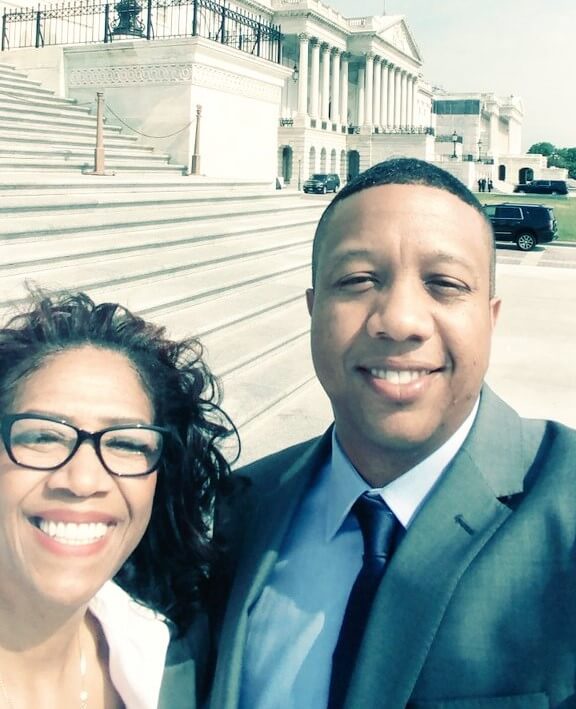The military community looks much different than it did decades ago. A mix of changing times and nearly 17 years of continuous war can do that to a group. In particular, the role spouses play has evolved from predecessors of past eras. They are authors and lawyers, nonprofit founders and CEOs of small businesses, and some are choosing to run for office at duty stations around the country. Over the last few years, veterans and military family members have found a voice in politics – and the trend is growing.
The homefront rises

Americans have different motivations for choosing the route of local and national politics. For some, they have always aspired to be a leader. Others, though, have encountered some experience in their life urging them to make a difference. The latter reason motivated a small group of women to create a platform for spouses who wanted to get involved in government in a bigger way.
Libby Jamison, an organizer for Homefront Rising, says the event’s idea came to life during the 2013 government shutdown.
“They (a group of military spouses) were sitting around having drinks during the shutdown and thinking how it was impacting military families, and civilians working on base were being furloughed. There’s always this uncertainty around paychecks for military member and so they thought, would this be any different if there were more military voices in these leadership positions,” she explained.
The event’s goal is to help military spouses become those representatives, Jamison added. And she says, they also want to disprove misconceptions surrounding what experience you need to run.
“You don’t have to run a nonprofit or have this crazy-insane-resume with a ton of work experience,” she said. “These volunteer opportunities can be the basis to run for office or volunteer on a campaign, serve on staff. So, all these skills we’re building as spouses, even in a volunteer capacity, where you’re organizing other volunteers and putting on events, building these grassroot groups to support each other, that’s all transferable into the politic sphere.”
Homefront Rising has been held annually for the last four years in conjunction with Military Spouse Appreciation Day.

‘Skin in the game’
Blue Star mom Tanzie Youngblood is among those women from the military community lending their voice to politics. She is running for a Congressional seat in New Jersey’s 2nd District. Her son, Anthony Youngblood serves in the Navy and is currently deployed overseas.
A longtime educator, she shares that politics “was never a dream of mine”.
“I never said I would be running for political office. It was never anything I ever aspired to be. I was a history buff, and I actually thought I was going to go to law school and be a lawyer. But, what happened was, I met this tall dark handsome man and I started a family, and never looked back,” Youngblood said.
However, life has a way of putting people on the path they are meant to be. A combination of professional experiences and the up-close view of military service led to the present-day decision to launch a campaign.
“Having him (Anthony) in the military, in my opinion, I got skin in the game. I really do. I am so concerned about the safety of this country and I’ve always been in favor of having a strong military,” she said. “I’ve always admired military men and women, and I’m just so proud of him. I never realized how difficult it was on families and it’s just given me a whole new perspective of how important the jobs of the military are.”
One of her obstacles with the campaign process, she says, has been the focus on big money and fundraising. Youngblood spends a great deal of her time raising funds. She also has dealt with the male dominance of politics and old school attitudes. Yet, she has seen women groups lift up female candidates to help create a more even playing field.
Tanzie’s resources –
Center for American Women in Politics
Take ownership of your duty station

Christine Gilbreath, a veteran and Army National Guard wife, always had aspirations for politics, but placed them on the backburner because of the busy nature of her husband’s service. By 2006, they were stationed in Texas and she felt the time was right to go all in on her dream. Step one was digging in deep to the community.
“One of the things I had done is, I attended meetings. City council meetings, the board meetings—like auxiliary boards, parks and recreation boards. Most cities have some type of boards that are like, planning and zoning boards. I signed up under the city and it would alert me when a board was meeting, and you can also view agendas of the meetings,” she described. “I’m a researcher, so I went to city website and looked back through the agendas and looked for trends.”
Gilbreath had concerns about the city’s economic development and where it was heading. Rather than sit on the sidelines, she decided to get involved in a bigger way.
“I had very strong ideas on what I wanted the city I lived in and planned on living in for the foreseeable future, if not the rest of my life, to do or do be. Not only for me and my kids, but for my neighbors, and when I saw started seeing a trend of opportunities we were and were not taking advantage of for our city, I wanted to get involved and push that agenda,” she clarified.
She ran for the Crowley City Council, won, and has served since 2013.
Her biggest challenge of campaigning was recognition—getting the citizens to know her and her stance on issues. Like most military spouses, Gilbreath wasn’t originally from this duty station. She relied on public records to get to know local citizens because online databases contain the names and addresses of voters.
Overall, Gilbreath recommends spouses re-arrange their thinking when it comes to a duty station. Whether you will be stationed there for a short tour or many years, she says you are in control of that experience—including your role in making that community what you think it should be.
Christine’s tips:
- Learn residency requirements for your area by viewing your town’s website;
- Review election information for your city to find out ethics information, filing rules and deadlines, state requirements for candidates;
- Attend local meetings [i.e. city council, board of commissioners, etc] to get to know people and the issues impacting the area.
Visit Homefront Rising for more information on getting involved in local and national conversations.
Read comments
































